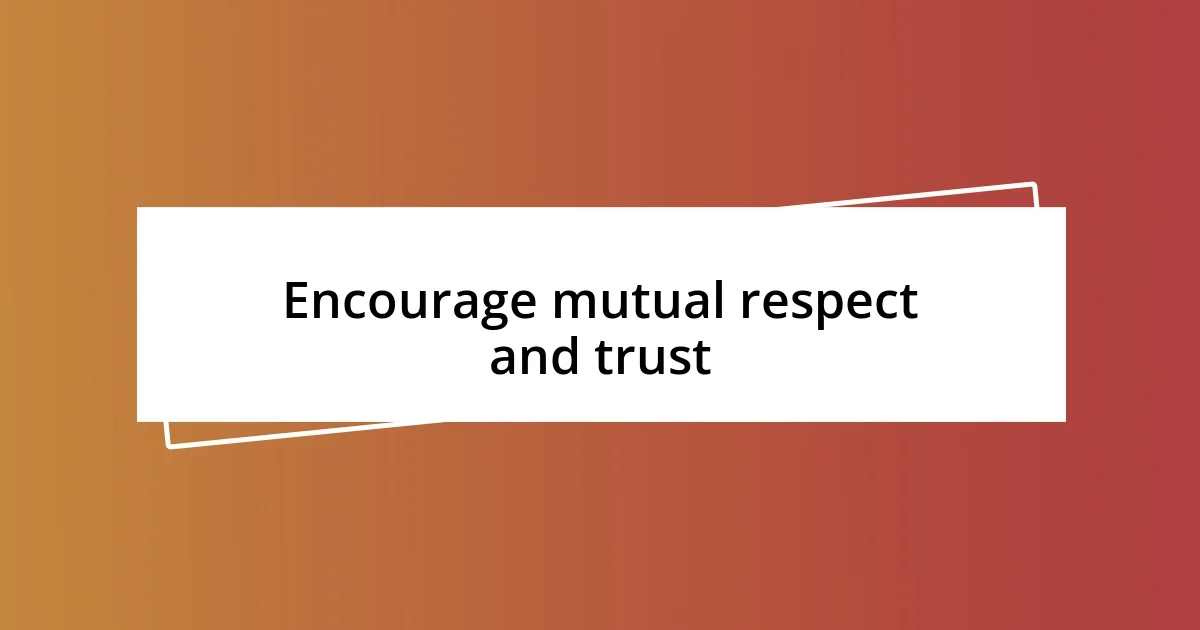Key takeaways:
- Teamwork fosters a sense of belonging and teaches crucial life skills, such as resilience and collaboration, through shared experiences and collective goals.
- Implementing effective communication strategies, such as open dialogue and establishing clear roles, enhances team dynamics and minimizes confusion.
- Recognizing and celebrating achievements, both big and small, instills a culture of appreciation and motivates team members to strive for future successes.

Understand the importance of teamwork
When I think about teamwork in sports, I can’t help but recall the thrill of my high school basketball team. We were a patchwork of different personalities, yet it was the collective effort that turned us into a formidable opponent on the court. Isn’t it fascinating how individuals working together can achieve far more than they ever could alone?
In my experience, teamwork fosters a sense of belonging. During my days on the field, the camaraderie we built through shared victories and setbacks created unbreakable bonds. Those friendships extended beyond the game, reminding me that the relationships we cultivate through teamwork can be just as valuable as the skills we develop.
Moreover, teamwork teaches crucial life skills. I vividly remember a match where we were down by twenty points. Instead of giving up, we rallied together, communicated, and strategized. That pivotal moment wasn’t just about winning; it was a lesson in resilience and collaboration that shaped not just our game, but our characters as well. Have you ever faced a challenge where teamwork made all the difference? I certainly have, and it drives home the point that working together truly elevates the experience.

Promote effective communication strategies
Promoting effective communication strategies in sports can truly transform a team’s dynamic. I’ve seen firsthand how clear communication not only enhances performance but also reduces frustration among teammates. For instance, during one of my soccer matches, our coach emphasized the importance of calling for the ball. Simple vocal cues turned our muddled plays into cohesive offensive strategies, and it was incredible how quickly we turned it around.
Here are some effective communication strategies worth implementing:
- Encourage open dialogue: Create a culture where players feel comfortable sharing their thoughts and concerns.
- Establish clear roles: When everyone understands their specific responsibilities, it minimizes confusion and enhances focus.
- Utilize non-verbal signals: Hand gestures or eye contact can convey essential information quickly during the heat of a game.
- Regular check-ins: Brief discussions after practices or games can reinforce team cohesion and allow for feedback.
- Foster a supportive environment: Build trust among teammates so they feel secure in engaging with one another.
Using these strategies can often mean the difference between a fragmented team and one that operates like a well-oiled machine.

Set clear team goals together
Setting clear team goals together is a crucial step in fostering effective teamwork. I remember one season where our coach organized a meeting. Each player was encouraged to voice their personal goals alongside the team’s objectives. This not only empowered everyone but also led to a collective commitment to achieving those goals. Have you ever felt more motivated when your input mattered?
Goals help shape a team’s identity. When my teammates and I agreed on a target—let’s say winning a regional championship—it was incredible how our individual efforts became more aligned. We each figured out how our unique skills contributed to that shared vision. It felt like we were all marching to the same beat, which naturally boosted our morale and performance.
Moreover, collaborating to set goals fosters accountability. I recall a pivotal moment when we missed a goal. Instead of blame, we came together to analyze what went wrong. The lesson learned was far more impactful than any victory could have been. By taking ownership of our collective transitions and recognizing areas for growth, we built not just a better team but also resilient individuals.
| Team Goals Setting Together | Impacts |
|---|---|
| Individual Input | Increased motivation and commitment |
| Shared Vision | Enhanced team identity and connection |
| Collaborative Accountability | Strengthened team resilience and growth |

Encourage mutual respect and trust
Mutual respect and trust are the cornerstones of a successful sports team. I vividly remember the time our basketball coach insisted on a day of team-building activities. It wasn’t just about improving our skills; it was about knowing each other on a personal level. By sharing stories and experiences, we learned to appreciate each other’s backgrounds and strengths, fostering an environment where respect became second nature. Have you ever felt how understanding someone’s journey can create a profound bond?
Building trust also requires vulnerability. I’ve seen how a small gesture, like a teammate admitting they were struggling with a particular skill, opened the floodgates for others to share their challenges. This honesty didn’t show weakness; it reinforced our shared humanity and created a safe space for everyone. When players respect and trust each other, they’re more likely to communicate openly, support one another, and ultimately strive for success together.
When teammates openly respect one another, it builds a sense of belonging that fuels motivation. I’ve definitely experienced that electrifying feeling of unity during high-stakes matches when every player has each other’s backs. Those moments make you not only want to win for yourself but for your teammates, too. Can you imagine how powerful it feels to know you’re part of a team that genuinely values each member? That camaraderie transforms individual effort into collective triumph.

Organize team-building activities
Organizing team-building activities is an effective way to foster connections and strengthen collaboration among teammates. I vividly recall a weekend retreat we had, filled with fun challenges and brainstorming sessions. Those activities pushed us out of our comfort zones and encouraged laughter, which naturally broke down barriers. Have you ever discovered new strengths in unexpected situations? For me, discovering my leadership skills during a simple trust fall exercise highlighted how much we can learn about ourselves when we work together.
During these activities, you often find that relationships deepen through shared experiences. There was a memorable obstacle course we tackled as a team, where each member had a role to play. Not only was it exhilarating to navigate the challenges, but it also revealed how we could rely on each other. The spirit of teamwork truly flourished, leading us to appreciate how each person contributed uniquely. I still think about how those moments of triumph brought us closer, reminding me of the importance of unity.
Ultimately, incorporating team-building activities into your routine sends a powerful message. I encountered a scenario where our coach integrated such activities regularly. Over time, it cultivated a culture of collaboration that extended beyond the field. Have you considered how these initiatives could transform your team’s dynamics? Seeing my teammates grow not just in skill but as individuals was gratifying. It made winning together all the more meaningful, as we celebrated not just the goals on the scoreboard, but the bonds we formed along the way.

Foster a supportive environment
Creating a supportive environment within a sports team can significantly enhance teamwork and morale. I recall a particular moment when our coach emphasized the importance of uplifting one another after a tough loss. During that debrief, we each took a turn to share not only what went wrong but also what we appreciated about each other’s efforts. This practice of highlighting the positives helped to buffer the disappointment and reminded us that we were all in this journey together. Isn’t it amazing how a simple acknowledgment can shift the mood of an entire group?
Another powerful way to foster support is through open communication. I vividly remember standing in a circle after practice, sharing our personal goals without the fear of judgment. It was as if an invisible barrier fell, and for the first time, we saw each other’s hopes and vulnerabilities. This openness created a profound sense of belonging, which, in turn, motivated everyone to rally around each other’s aspirations. Have you experienced that moment when simply speaking your truth brings a team closer?
Manifesting a culture of support is also about showing empathy. There was one season when a teammate was struggling not just with performance but also personal issues off the field. Instead of shying away, the team rallied around her with care and understanding, helping her find balance. I realized then how fundamental it is to extend a hand during those tough times, as it transforms the team into a safe haven. Isn’t it incredible how support in times of need can turn a group of individuals into a true family?

Recognize and celebrate team achievements
Recognizing and celebrating team achievements can create an atmosphere where every member feels valued and motivated. I remember when our team won a regional tournament and we had a mini-awards ceremony. Each player received a certificate and a chance to share their favorite moment from the journey. That day, I felt such a surge of pride not just for the trophy, but for the acknowledgment of each person’s contributions. Have you ever seen how collective joy can ignite a team’s spirit?
Celebration doesn’t always have to be grand. Sometimes, it’s the small gestures that resonate the most. After one particularly challenging game, our coach brought in pizza for a post-match hangout. We spent the evening reminiscing about the effort we all put in, laughing over shared mistakes, and truly savoring the moment together. It wasn’t just about the victory; it was about recognizing the hard work and camaraderie that brought us to that point. Don’t you agree that fostering that sense of belonging can propel a team forward?
Moreover, making achievements visible can spark motivation for future efforts. I distinctly recall our team creating a “Wall of Fame” in the locker room, showcasing not just the wins but personal milestones, like most improved player or best supporting teammate. Walking past that wall each day served as a constant reminder of what we could achieve together. It helped cultivate an attitude of recognition that went beyond mere statistics. Isn’t it fascinating how simple acts of recognition can fuel ongoing dedication within a team?














